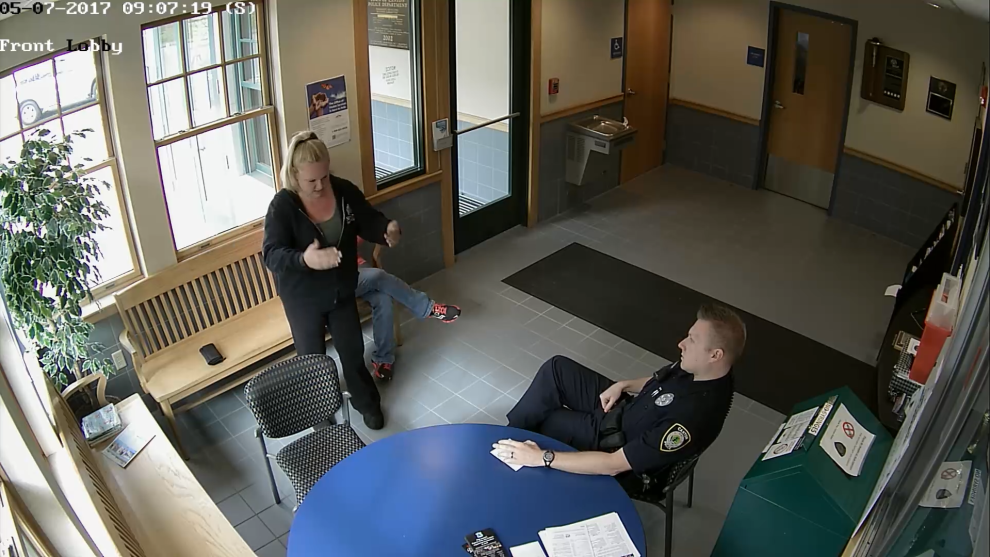
Nicole Chase’s first interview with Canton Police Officer Adam Gompper occurs in the Police Department’s front lobby in May 2017.Canton Police Department
A landmark bill aimed at standardizing and improving the way police treat victims in the aftermath of a sexual assault has become law in Connecticut.
The new law establishes a council that will create a model policy for police responding to sexual assault, and it received unanimous, bipartisan support. The law also requires that officers refer victims to a victim advocate, distribute information about services available, and help the victim and any children present obtain medical care. Every law enforcement agency in the state will have to meet or exceed the model policy by September 2025, and the council will collect data about police and the overall criminal justice response to sexual assault statewide.
Democratic state Rep. Eleni Kavros DeGraw, a co-sponsor of the bill, cited an investigation by Reveal from The Center for Investigative Reporting in her testimony about the need for sexual assault victims to be treated better by law enforcement. The investigation, featured in Victim/Suspect, a documentary film by Center for Investigative Reporting Studios, found dozens of cases, including several in Connecticut, in which women reporting sexual assaults were ultimately charged with crimes after law enforcement doubted their stories or zeroed in on behavior common for victims of trauma.
“This isn’t just a bill that victims and survivors want, it’s a bill that law enforcement also wants and needs in order to serve the public to the very best of their ability,” Kavros DeGraw said.
Kavros DeGraw attended a screening of Victim/Suspect sponsored by the Bipartisan Women’s Caucus last fall. There, she met Nicole Chase, who was featured in the film and an episode of Reveal and a constituent of Kavros DeGraw’s.
Chase told an officer in the Canton Police Department in 2017 that her boss had sexually harassed her and ordered her to perform oral sex. When she acknowledged weeks later in a formal interview that the sex act had occurred, the detective concluded she’d lied by omission and charged her with making a false statement.
“I was unaware that (this phenomenon) was happening, not just all over Connecticut, but also all over the country,” Kavros DeGraw said.
Prosecutors later dropped the case against Chase, and the city of Canton eventually settled a civil lawsuit. Her boss was never charged with any crime. Kavros DeGraw vowed she would do something about Chase’s treatment.
During a public hearing on the bill, Kavros DeGraw used Chase’s case as an example of why the new bill is needed. “While the case was eventually settled in court in favor of the survivor, it does not erase the trauma the survivor experienced,” she said.
Gov. Ned Lamont signed the bill into law this month.
Our investigation into sexual assault cases found that police routinely deploy interrogation techniques meant for criminal suspects on alleged victims, including lying about evidence. When reporting victims recant or backtrack, it can lead to false reporting charges: Of 52 cases involving false reporting charges that we analyzed closely, nearly two-thirds involved a recantation. In nine cases, the recantation was the only evidence cited by police.
About half of the 52 cases we analyzed came from Connecticut, where a statewide court system allowed us to more easily locate false reporting cases tied to sexual assault. Our analysis found four Connecticut cases in which the reporting victim was arrested or charged with a crime within 24 hours; in two cases, a recantation was the only evidence police cited. In one prominent Bridgeport case, an 18-year-old reported she was raped by two men at an off-campus college party. Detectives concluded that the sex was consensual and charged her with false reporting and felony tampering with evidence.
But the detectives’ conclusion was based largely on her recantation during a 45-minute recorded interview-turned-interrogation. The audio recording showed that a detective lied to her about nonexistent evidence, told her that she wasn’t telling the truth, interrupted her frequently, and repeated questions again and again until she agreed with him that the sex was consensual. She was not aware that she had become the suspect of a crime and was interviewed alone. She pleaded guilty to two counts of second-degree falsely reporting an incident and one count of interfering with police and was sentenced to a year in prison.
While the new law doesn’t specifically mention the use of false reporting charges against alleged sexual assault victims, it aims to address the circumstances under which victims often fall under suspicion. Chase endured a long police interview alone, and she thinks an offer for support from a victim advocate could have changed the entire trajectory of her case, had the police specifically mentioned it, as they’ll now be required to do.
“You’re sitting with somebody that’s not judging you, that knows what trauma does,” she said. “It is just somebody there to be there for you.”
Chase said having an advocate might have made her feel safe enough to disclose more details earlier in the process – and maybe prevent the arrest that followed.
She hopes the model policy will more clearly define what a false report is, since she was charged based on not being forthcoming enough.
“That’s not lying,” Chase said. “That’s not falsely reporting something. That is just not being willing to open up to you yet because I don’t feel comfortable with you.”
Kavros DeGraw said she intends for the newly created council to specifically address the use of false reporting charges against victims in its model policy and to mandate trauma-informed training for police to combat misconceptions about missing details or inconsistent statements.
“There are so many pieces to the trauma of these incidents,” she said. “You may not have all of the details in that first meeting, and not because of omission or purposeful lying, but because you have just experienced a trauma, and often it comes back over time.”















